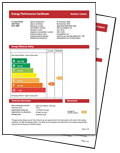Energy Performance Certificate
SAP calculations
BER Certs (ROI)
Display Energy Certificate
Commercial Energy Certificate
Energy Audits
Asbestos Surveys
Fire Risk Assessments
Thermal Imaging
Air Tightness Testing
Energy Saving Tips Home Energy Saving Tips That Save You Money
Turn down your thermostat. For every degree you lower your heat in the 22°C to 17°C range, you'll save up to 10 percent on heating costs. Wear warm clothing like a sweater and set your thermostat to 20°C degrees or lower during the day and evening, health permitting. Set the thermostat back to 15 degrees at night or when leaving home for an extended time.
An insulating jacket for a hot water tank only costs a few pounds and pays for itself within months. Fit one that's at least 75mm (3") thick and you could save around £20 a year. If every UK household fitted a jacket on their tank tomorrow, we'd save over £95 million of energy every year!
If you use a particular light for an average of four hours or more a day, then replace it with an energy-saving equivalent - which will use around a quarter of the electricity and last up to 12 times longer. Each energy efficient bulb fitted could give you an estimated saving of £9 off your energy bill per year.
Of course it should be hot, but it doesn't need to be scalding. For most people, setting the cylinder thermostat at 60°C/140°F is fine for bathing and washing. This can save up to £150 per year. Take more showers than baths. Bathing uses the most hot water in the average household. You use 60-90 litres of hot water for a bath, but less than 35 litres gallons during a 5-minute shower.
Heat the amount of water you really need and if you're using an electric kettle, make sure you cover the elements. More modern kettles have no visible element so you use less water, you could also try to fill a cup and use it as a guide to fill the kettle, so that you boil the right amount of water.
At night, pull the curtains to stop heat being lost through the windows. Take care not to drape curtains over radiators as this will funnel heat straight out of the windows.
Switch off your TV, DVD or Video at the set. Standby can use as much as 10%-60% of the electricity that would be used by the device if it was switched on. Also don't forget to turn your Computer monitor off, as it too wastes electricity if left on.
When purchasing kitchen appliances such as fridges, freezers, dishwashers and washing machines, opt for a more energy efficient appliance. An EU Energy Label should be displayed (A to G Scale) on appliances for sale in order to help you make a choice, "A" being the most efficient and "G" being the worst guzzler for energy.
Tumble driers are energy guzzlers so try to use washing lines or airers. Don't put very wet clothing into the dryer, make sure you wring clothing out or spin dry again to help use less energy.
These are the most hardworking appliances in the home. Avoid putting Warm or Hot Foods in the fridge, let them cool down first. Don't leave the Fridge or Freezer door open, this means the fridge uses more energy to cool itself back down due to the cool air lost opening the door.
Upgrading loft and, where possible, cavity insulation, will save energy in your home by reducing energy losses through the building fabric Insulating your loft is one of the simplest ways to save energy and you can even install it yourself. Insulate you loft today and in a year you could between £180 and £220. Around 33% of the heat lost in your home is through the walls, so insulating them can be the most cost-effective way to save energy in the home - you could save £130 to £160 on your annual heating bills! Cavity wall insulation will also keep you cool in the summer and warm in winter. It's straightforward, inexpensive and hassle-free
If your boiler is over 15 years old it's probably time to replace it. You should have your boiler professionally serviced at least once a year. A clean and serviced appliance will operate more economically and will have a longer service life.
Eliminate draughts and wasted heat by installing a cheap, easy-to-fix brush or PVC seal on your exterior doors. Letterboxes and keyholes should be covered too. You can install draught proofing yourself.

Energy Performance Certificate
We specialise in the provision of Energy Performance Certificates and Display Energy Certificates for buildings.
DD Energy Rating is the leading provider of Energy Performance Certification, our team of energy rating experts can carry out the necessary assessment needed to generate an accurate rating and regulatory compliance.
